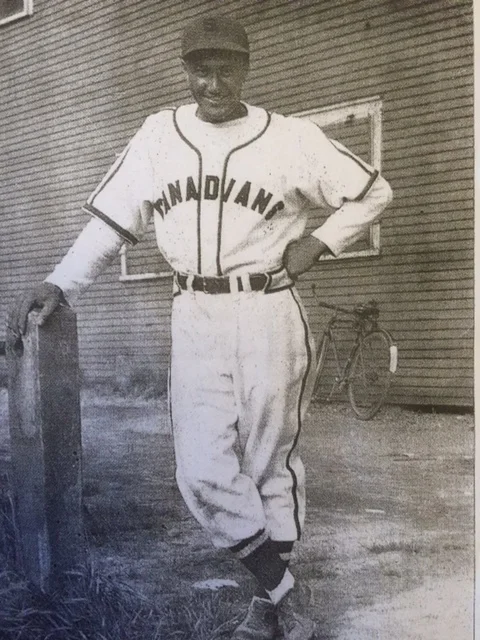Manny McIntyre, first Canuck to break modern-day colour barrier
By: Andrew Hendriks
Canadian Baseball Network
Earlier this year, we at the Canadian Baseball Network ran a story on Fred Thomas; an outfielder from Windsor, ON who had mistakenly been thought to have broken the Canadian-born professional baseball colour barrier when he first appeared with class-A Wilkes-Barre in 1948.
Admittedly, we had that wrong.
Although Thomas was the first African-Canadian to receive a development contract from a big league club following Jackie Robinson's MLB arrival in 1947, New Brunswick's Vincent Churchill McIntyre was, in fact, the first Canuck to officially break the colour barrier in the modern era when he suited up for the Class-C Sherbrooke Canadians of the Border league on June 1st, 1946.
In a move aimed at integrating the grand old game, a total of six black ballplayers were signed to minor league pacts in advance of the '46 season. Five of them became products of Branch Rickey's Brooklyn Dodgers organization while another was brought in by the World Series-bound St. Louis Cardinals.
Along with Robinson, Brooklyn acquired the services of future stars in Roy Campanella and Don Newcombe while also landing a pair of ex-Negro League standouts in both Roy Partlow and John Wright.
Fully aware of their N.L. rivals efforts to amalgamate the professional game, St. Louis came to terms with the relatively lightly-scouted Canadian infield prospect on May 31st, 1946.
Until that point, McIntyre, an impressive hockey player on the local circuit, spent his summers appearing with a handful of different independent ball clubs in both New Brunswick and Nova Scotia and had also recently helped the Halifax Shipyards earn a playoff berth in 1943 after batting a robust .385 during regular season play. A year later, the veteran infielder captured an MVP award after his Shipyards were crowned as the Halifax Defence League champions.
A product of his time, the young shortstop was often the black player on these teams and, due to his ethnicity, often faced the same challenges that plagued Robinson during the years that led up to and passed the game's first wave of integration.
Cognizant of his ability to handle adversity, St. Louis placed McIntyre in the Border League where, playing in only 30 games that season, he responded by collecting a total of 40 hits en route to recording an overall batting average of .310 for Sherbrooke in '46.
In an unfortunate turn of events, an old hockey injury began to flare up and ultimately rendered the 26-year-old incapable of continuing past June 30th of that season. The affliction, a nagging shoulder issue, was only amplified by the daily rigors of playing competitive ball and subsequently ended his professional career before it had a chance to truly take off.
Other reports, including a program excerpt from a 2011 memorial dinner held in McIntyre's honor, indicate that his departure from the Canadians was also due to a lack of general support from his all-white teammates off the field.
Despite derailing his affiliated baseball career, general racisim and the shoulder ailment did little to deter the Gagetown, N.B. native from pursuing a lasting career on the rink.
McIntyre (or Manny as those familiar with the multi-sport star often called him) returned to the Quebec Provincial Hockey League's Sherbrooke Rand in the fall of '47, reuniting with both Ossie and Herb Carnegie as a pivotal member of the "Black Aces", professional hockey's first all-black starting forward line.
With stops in a number of different cities including Timmins, Buffalo and Shawinigan Falls to name a few, the trio spent the better part of the 1940's thrilling hockey fans with their unique blend of hard-hitting action and a lightning fast play.
"The Coloured Line, as a line, could have played on any team, any time, anywhere" once wrote respected NHL referee Red Storey. That statement was backed up by a 4-2 Sherbrooke win over Maurice Rocket Richard and the fabled Montreal Canadiens in an exhibition contest held when the trio was in the midst dominating the QSHL during the 1940's.
For both his many years as a landmark on Eastern-Canada's professional sports scene and overall trailblazing efforts, McIntyre was inducted into the New Brunswick Sports Hall of Fame in 1997.
Having passed away in Candiac, Que. at the age of 92 in 2011, McIntyre was later inducted into Canada's Sports hall of Fame in 2015 and has been additionally nominated for the Canadian ball hall as well.
This past June marked the 70th anniversary of McIntyre's historic accomplishment with regards to Canadians in affiliated baseball, an event that helped pave the road for a respectable portion of the countries most impactful talent.
Talent such as Ferguson Jenkins, a lanky right-handed hurler who signed his first professional contract with the Philadelphia Phillies only 16 years after McIntyre appeared in Sherbrooke. Jenkins went on to win 284 games during his 19 year MLB career, accumulating a total of 267 complete games and earning an induction into Cooperstown in 1991.



